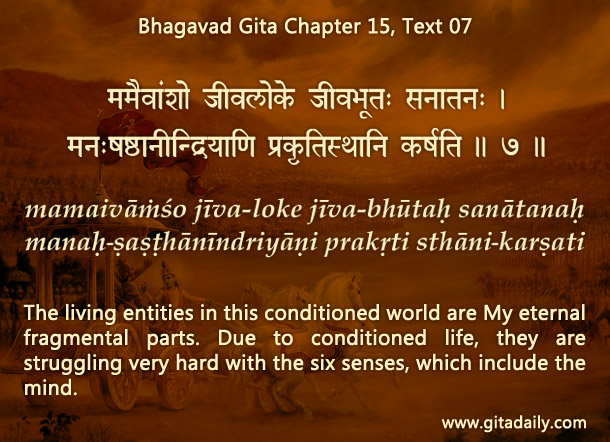The idea of freedom captivates the human mind. Stories of freedom fighters frequently become legends. National independence struggles often become inspirational memories for citizens.
Most often, these struggles for freedom center on external freedom, especially in the form of political freedom from excessive or exploitative control by others. While such freedom is undoubtedly necessary for all human beings, is it sufficient? Let’s see. Some people who become free from external control go out of control themselves, whereby they end up making choices that damage or even destroy them, as well as those around them. How can such a tragic trajectory be avoided? How can our longing for freedom be constructively directed?
The Bhagavad-gita stands ready with a vision for such holistic freedom, wherein it states both what we need to be free from and what we need to be free for. It focuses more on inner freedom for it asserts that we need to free ourselves from our lower nature, which comprises our own weaknesses such as lust, anger, and greed. To the extent individuals can free themselves from these inner enemies, they can protect themselves from going down the path of self-destruction, be it by their unwitting choices or by their unwilling compliance with their conditionings.
Simultaneously, more important than freedom from is freedom for. The Bhagavad-gita emphasizes that we need to be free for our higher nature to manifest: that is, for our spirituality (sat-cit-ananda) to become awakened. Thereby, we can delight in the security that comes from realizing our eternity (sat), in the sagacity that comes from utilizing our curiosity (cit) and the ecstasy that comes by experiencing our joyfulness (ananda). Especially the fullest manifestation of our higher nature happens when we connect with our source, the all-loving, all-attractive divinity, Krishna. Empowered by that connection, we relish our own divinity as pure, potent and precious parts of the divine (Bhagavad-gita 15.07).
When our higher nature manifests thus, we all can become powerful agents of positive change in the world. Thus, we illuminate our inner world by our spiritually purified thoughts. And we elevate our outer world, or at least our corner of our outer world, by our spiritually powered words and actions. This indeed is the ultimate purpose of freedom and it is to this freedom that the Bhagavad-gita calls all of us.
Summary:
The most fulfilling freedom is freedom from our lower nature so that we rejoice in the freedom for our higher nature.
Think it over:
- What does freedom mean for most people?
- For freedom to be fulfilling, what do we need freedom from?
- For freedom to be fulfilling, what do we need freedom for?
***
15.07: The living entities in this conditioned world are My eternal fragmental parts. Due to conditioned life, they are struggling very hard with the six senses, which include the mind.
Audio explanation of the article is here: https://gitadaily.substack.com/p/indian-independence-day-special-the

To know more about this verse, please click on the image

Leave A Comment